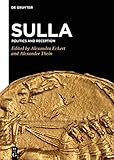Sulla : Politics and Reception / ed. by Alexandra Eckert, Alexander Thein.
Material type: TextPublisher: Berlin ; Boston : De Gruyter, [2019]Copyright date: ©2020Description: 1 online resource (IX, 207 p.)Content type:
TextPublisher: Berlin ; Boston : De Gruyter, [2019]Copyright date: ©2020Description: 1 online resource (IX, 207 p.)Content type: - 9783110618099
- 9783110624823
- 9783110624700
- online - DeGruyter
- Issued also in print.
| Item type | Current library | Call number | URL | Status | Notes | Barcode | |
|---|---|---|---|---|---|---|---|
 eBook
eBook
|
Biblioteca "Angelicum" Pont. Univ. S.Tommaso d'Aquino Nuvola online | online - DeGruyter (Browse shelf(Opens below)) | Online access | Not for loan (Accesso limitato) | Accesso per gli utenti autorizzati / Access for authorized users | (dgr)9783110624700 |
Frontmatter -- Acknowledgements -- Contents -- Contributors -- Introduction -- Part I: Politics -- 1. Sulla the Orator -- 2. Sulla’s Relations with the Poleis of Central and Southern Greece in a Period of Transitions -- 3. Can a Dictator reform an Electoral System? A Reassessment of Sulla’s Power over Institutions -- 4. Dolabella’s Naval Command -- 5 Paludes et Silvae: The Ruin of the Veteran -- Part II: Reception -- 6. Sulla in the Bellum Jugurthinum -- 7. Sulla’s Long Shadow: Sallust in Tacitus and Tacitus in Sallust -- 8. Sulla and the Philosophers: The Cultural History of the Sack of Athens -- 9. Reconsidering the Sulla Myth -- Abbreviations -- Bibliography -- Index of Ancient Authors -- Index of Ancient Persons and Deities -- Index of Ancient Places -- General Index
restricted access online access with authorization star
http://purl.org/coar/access_right/c_16ec
This book brings together an international group of scholars to offer new perspectives on the political impact and afterlife of the dictator Lucius Cornelius Sulla Felix (138–78 B.C.), one of the most important figures in the complex history of the last century of the Roman Republic. It looks beyond the march on Rome, the violence of the proscriptions, or the logic of his political reforms, and offers case studies to illustrate his relations with the Roman populace, the subject peoples of the Greek East, and his own supporters, both veterans and elites, highlighting his long-term political impact and, at times, the limits on his exercise of power. The chapters on reception reassess the good/bad dichotomy of Sulla as tyrant and reformer, focusing on Cicero, while also examining his importance for Sallust, and his characterisation as the antithesis of philhellenism in Greek writers of the Imperial period. Sulla was not straightforward, either as a historical figure or exemplum, and the case studies in this book use the twin approach of politics and reception to offer new readings of Sulla’s aims and impact, both at home and abroad, and why he remained of interest to authors from Sallust to Plutarch and Aelian.
Issued also in print.
Mode of access: Internet via World Wide Web.
In English.
Description based on online resource; title from PDF title page (publisher's Web site, viewed 27. Jan 2023)


